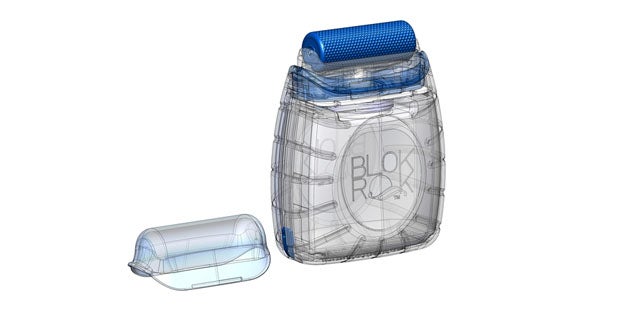Arianna Megaro ’13 was on vacation the summer before her senior year at the College of Charleston and she wanted to wear sunscreen, but she hated getting it on her hands.
By the time she graduated, she had prototypes of a sunscreen applicator that she designed with the help of a fluidics engineer. One year after graduation, her product has received patent approval and is being manufactured.
RELATED: BlokRok is accepted to Harbor Accelerator, a 14-week business accelerator.
Full disclosure: Megaro’s father is an entrepreneur, so he helped her navigate the process, but she offers valuable advice for other budding inventors.
1. You need more than an idea.
Coming up with a product idea is the easy part. It’s the next 18 to 24 months that separate the entrepreneurs from everyone else.
Megaro says she has boxes of products that she bought to try and compare. Not just sunscreen applicators – products that incorporated any part of her design. She has paint and hair wax rollers, dozens of products with piston pumps, and all brands of deodorant sticks (they’re about the same size and shape as BlokRok). And she was ready and willing learn anything she didn’t know.
“I had a hard time finding a good manufacturer, so my Dad and I actually bought Injection Molding Part Design for Dummies, hoping to learn as much as we could about the plastic manufacturing process. Luckily, after much research and cold calling, we found a suitable manufacturer!”
RELATED: Learn more about how the development of BlokRok.
2. Have no fear.
 As an international studies major, Megaro didn’t have a strong background in fluids or engineering or manufacturing, but her professors pushed her to think outside the box and try new things.
As an international studies major, Megaro didn’t have a strong background in fluids or engineering or manufacturing, but her professors pushed her to think outside the box and try new things.
She says one of most valuable things she learned throughout the business development process was how to approach an expert and ask if she could pick their brain for 10 minutes.
“It’s surprising how many people are more than willing to sit down and talk with you – starting with professors,” Megaro says. “If I had a marketing question, I would find a marketing professor ask for a meeting. Most professors’ eyes would light up when I told them I was launching a product and wanted their advice.”
Megaro remembers her freshman year when she thought she’d never go to a professor’s office hours because she felt awkward and was scared of asking stupid questions. But she pushed herself to go and ask questions, and by her senior year when she was developing BlokRok, she had no fear.
RELATED: Getting help from your professors made easy: 6 tips.
3. Find experts.
If you’re designing a new product, you probably need to go beyond getting free advice. Megaro worked with three experts through the process.
- Industrial design engineer: Helped design a product that could be manufactured and distributed. He made the working prototype look like a commercial product, and helped with manufacturing logistics.
- Specialized engineer: Megaro worked with a fluidics engineer to help design her pump mechanism so the sunscreen would go from the liner into the roller. He helped take Megaro’s drawings to the next step, and together they came up with some designs that were innovative, and worthy of filing a patent for.
- Registered patent attorney: Helps to draft the patent application and think through all of the independent and dependent claims to ensure your invention is protected. Protection of your “art” or inventions is crucial, as it will limit people from stealing your ideas and designs.
4. Sweat the small stuff.
If you’re applying for a patent, be ready for excruciating detail.
“You’re trying to protect yourself from 100 different angles,” Megaro says. “So you have to look at your product part-by-part to determine what your claims will be. You have to know what existing patents might block your claims, so there’s a lot of research and reading involved. It’s really an art – that’s why a patent attorney is so important.”
Megaro expects her patent to issued on June 24, 2014.
5. Location matters.
After she graduated, Megaro contemplated moving home to North Carolina to save money, but she soon realized that because her product related to a beach lifestyle, she needed to live on the coast. She was fortunate enough to have the support of her parents to help her continue to pursue BlokRok in Charleston.
RELATED: Charleston is an ideal place to start a business.
“There are a ton of resources in Charleston – from events like Dig South, to entrepreneur meet-ups. Plus, being a College of Charleston alumna has opened doors – once people hear that, they are more willing to give me advice or be a mentor.”
6. Failure is good.
 She had to start over or “go back to the drawing board” more times that Megaro can count. She says it was frustrating, but worth it.
She had to start over or “go back to the drawing board” more times that Megaro can count. She says it was frustrating, but worth it.
“It taught me how to problem solve in a real-life setting. I learned how to not lose my cool, how to delegate. By learning what didn’t work, could figure out what did. It was an invaluable experience, and despite the frustrations, one that was extremely exciting and rewarding.”
Megaro has been accepted to graduate school, but deferred for a year to work on BlokRok.
“My hope is that BlokRok grows and is bought out by one of the big lotion power houses like Hawaiian Tropic or Coppertone. I’m not certain that I’m a serial inventor, but I do love the challenge and exciting lifestyle of entrepreneurship. My dream is to work in international public policy for an organization that focuses on development through innovation.”





